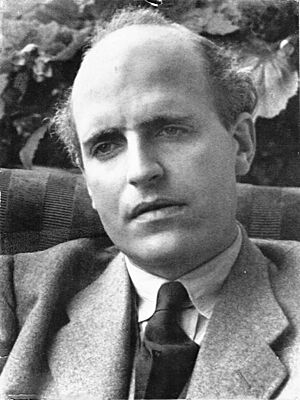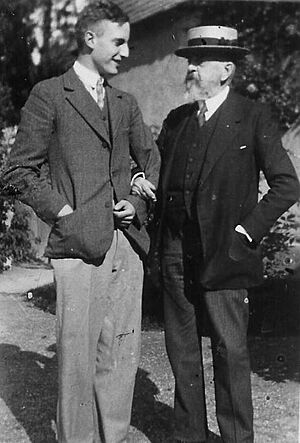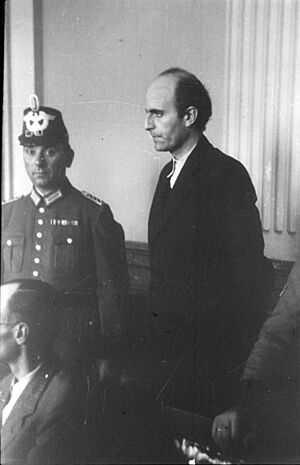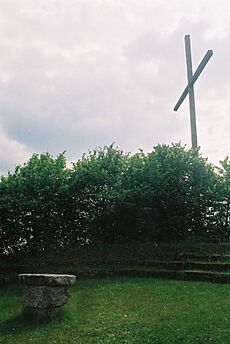Adam von Trott zu Solz facts for kids
Quick facts for kids
Adam von Trott zu Solz
|
|
|---|---|

Trott zu Solz in 1943
|
|
| Born | 9 August 1909 |
| Died | 26 August 1944 (aged 35) Plötzensee Prison, Berlin, Nazi Germany
|
| Cause of death | Execution by hanging |
| Nationality | German |
| Alma mater | University of Munich University of Göttingen Mansfield College, Oxford Balliol College, Oxford |
| Occupation | Diplomat, lawyer |
| Known for | Opposing the Nazi government and taking part in the 20 July Plot |
| Spouse(s) | Clarita Tiefenbacher (1940–1944 his death) |
| Children | Two daughters |
| Parent(s) |
|
Friedrich Adam von Trott zu Solz (born August 9, 1909 – died August 26, 1944) was a German lawyer and diplomat. He was part of the group that resisted the Nazi government. From the very beginning, he was against the Nazi regime.
Adam von Trott was an active member of the Kreisau Circle. This was a secret group led by Helmuth James Graf von Moltke and Peter Yorck von Wartenburg. He also worked with Claus von Stauffenberg in the 20 July plot. This was a plan to overthrow Hitler. If the plan had worked, he was supposed to become a high-ranking official in the German government. He would have been in charge of talking with the Western Allies.
Contents
Life Story
Growing Up and Early Work
Adam von Trott was born in Potsdam, Germany. His family, the Trott zu Solz, were old German nobility. He was the fifth child of August von Trott zu Solz, who was a Prussian Culture Minister. His mother, Emilie Eleonore, was the great-great-granddaughter of John Jay. John Jay was one of the important founders of the United States.
Adam grew up in Berlin and later in Kassel. He went to good schools and finished high school in 1927. After that, he studied law at the Universities of Munich and Göttingen.
He became very interested in world politics during a trip to Geneva in 1928. Geneva was where the League of Nations was located. This was an organization that tried to keep peace in the world. In 1929 and 1931, he studied at Mansfield College, Oxford and Balliol College, Oxford in England. He made many close friends there, including David Astor.
During the Great Depression, a time when many people lost their jobs, Adam von Trott thought deeply about society. He believed that capitalism had failed. But he also didn't like communism. He looked for a "Third Way" that would combine good ideas from both. He felt that everyone should have the "right to work." He thought that individual freedom wasn't worth much if people couldn't find jobs.
Travels and Ideas
In 1937, Trott went to China to do research. He used his travels to secretly try and get support against the Nazis from outside Germany. At that time, Germany and China had a friendly relationship. German military officers were even training the Chinese army.
Trott was very interested in Chinese culture and philosophy. He hoped to find answers to the problems of the Western world in "China's ancient wisdom." He studied Confucian philosophy and Mandarin. He believed that the Confucian idea of wise leaders could inspire a better political system. He also liked the Confucian idea that good leaders should not serve an unfair ruler.
During the Second Sino-Japanese War (which started in 1937), Trott supported China. He became friends with General Alexander von Falkenhausen, who led the German military mission in China. Both of them disliked the pro-Japanese policies of the German Foreign Minister, Joachim von Ribbentrop. When the German military mission was called back in 1938, Trott also left China.
One of Trott's friends was the British journalist Shiela Grant Duff. They often disagreed, especially about Czechoslovakia. Trott, like many German nationalists, believed that Germany had a right to take the Sudetenland region from Czechoslovakia. He saw Czechoslovakia as an "artificial state." This showed a difference in his thinking: he supported China's right to be free but not Czechoslovakia's.
In 1939, Trott visited London three times. He tried to convince British leaders like Lord Lothian and Lord Halifax to change their policy towards Hitler. He was working unofficially for Ernst von Weizsäcker, a German official who also opposed Hitler's reckless foreign policy. Trott's goal was to prevent a war between Britain and Germany. He suggested that Britain should stop supporting Poland if Germany restored independence to Czechoslovakia (without the Sudetenland).
However, British leaders told Trott that they could not abandon Poland. They said that Germany needed to fix the problems Hitler had caused. They were very upset by Germany's takeover of Czechoslovakia in March 1939.
Trott's ideas were complex. He was against Hitler, but he also had strong German nationalist views. He believed Germany had a right to expand its influence in Eastern Europe. Some of his British friends found it hard to understand his position. They felt he was sometimes saying the same things as the Nazis, even though he was secretly working against them.
Many Germans who opposed Hitler did not want to bring back the old democratic system. They wanted to reform Germany and create a "true" volksgemeinschaft (people's community). They believed Hitler's foreign policy goals were right, but his methods were too risky. Trott's actions showed this "ambivalence." He worked towards some of Germany's goals while also trying to overthrow the Nazi regime.
Trott believed that modern society, both democratic and totalitarian, had lost its spiritual side. He felt that the "mass society" created by the Industrial Revolution allowed bad leaders to control people. He thought that only traditional, Christian-based leaders could create a truly fair society. He wanted a system where these elites would ensure everyone had their basic needs met, but without the "masses" directly involved in politics.
In August 1939, the British government warned Germany that attacking Poland would lead to war. Many hoped that the German army would overthrow Hitler rather than start another world war. However, when Germany invaded Poland on September 1, 1939, the army remained loyal to Hitler. This made it harder for the German resistance movement to gain support from Britain.
In October 1939, Trott joined the German Foreign Office. He used this position as a cover for his anti-Nazi activities. He traveled to different countries, trying to find German military officers who opposed Hitler. He also went to the United States to attend a conference. There, he met with American officials and tried to get their support for the German resistance. He suggested peace terms, but these terms still allowed Germany to keep some of its gains in Poland and Czechoslovakia. This was not acceptable to the Allies.
Working Against the Nazis
Friends warned Trott not to return to Germany, but he felt he had to go back to fight Hitler. In 1940, he even joined the Nazi Party to get access to information. At the same time, he secretly advised the Kreisau Circle, a group of thinkers planning to overthrow the Nazis.
Trott also worked with Subhas Chandra Bose, an Indian nationalist, in a special department of the German Foreign Office. This work gave him a reason to travel around Europe and meet with other Germans who opposed Hitler.
The Kreisau Circle believed in a mix of conservative and Christian socialist ideas. They were in touch with other resistance groups, but they had some disagreements. For example, the younger members of the Kreisau Circle, like Trott, did not want to bring back the German monarchy.
By 1942, Trott and others in the Kreisau Circle started to learn about the terrible "Final Solution to the Jewish Question" (the Nazi plan to kill all Jews). In March 1943, Trott reported that he had learned about a concentration camp in Upper Silesia (likely Auschwitz) where thousands of people were being killed each month.
Trott believed that only a wise elite could govern well. He thought that Germany should find a "middle way" between the collectivism of the East (like the Soviet Union) and the individualism of the West (like the United States). He felt that both capitalism and communism had problems. He was interested in the idea of the Russian mir (a traditional village community), which he saw as a blend of community and individual freedom.
Trott was part of the "Easterner" group within the resistance. They thought it might be better to make peace with the Soviet Union first after Hitler was gone. They were not sure if they could trust the United States and Britain. In April 1944, Trott met with British and American diplomats in Switzerland. He told them that many anti-Nazi Germans felt the Western countries were too prejudiced. He said that the Soviet Union seemed to offer more "constructive ideas" for rebuilding Germany.
Historians say that Trott was not a supporter of communism. He was trying to get the Western Allies to offer better terms for Germany after Hitler was overthrown. He wanted a new kind of society in Germany that was neither authoritarian nor democratic, but based on Christian values.

The 20 July 1944 Plot
Adam von Trott was one of the main leaders in Colonel Claus von Stauffenberg's plot to kill Hitler on July 20, 1944. He was arrested a few days later. He was put on trial and found guilty. On August 15, 1944, the Volksgerichtshof (People's Court) sentenced him to death. He was executed by hanging in Berlin's Plötzensee Prison on August 26, 1944.
Remembering Adam von Trott
Adam von Trott is one of five Germans remembered on the World War II memorial stone at Balliol College, Oxford. His name is also listed at Rhodes House, Oxford, among those who died in the war.
In 1998, the magazine Prospect published a speech by German historian Joachim Fest. Fest spoke at the opening of the Adam von Trott Meeting Room at Balliol College. He said that not many records survived about the German resistance. He felt that honoring Adam von Trott was an act of justice.
Mansfield College, Oxford also holds yearly lectures and offers scholarships in Adam von Trott's name. These help young Germans study politics at the college.
Clarita von Trott
Trott married Clarita Tiefenbacher in June 1940. She survived him, even though she was jailed for several months after his execution. Their two daughters were taken by the Gestapo (Nazi secret police) and given to Nazi families. Clarita got her daughters back in 1945. She passed away in Berlin in 2013 at the age of 95.
Famous Words
- "I am also a Christian, as are those who are with me. We have prayed before the crucifix and have agreed that since we are Christians, we cannot violate the allegiance we owe God. We must therefore break our word given to him who has broken so many agreements and still is doing it. If only you knew what I know Goldmann! There is no other way! Since we are Germans and Christians we must act, and if not soon, then it will be too late. Think it over till tonight." (Trott said this while trying to get Lieutenant Gereon Goldmann to join the 20 July Plot.)
Writings
- Hegels Staatsphilosophie und das internationale Recht; Diss. Göttingen (V&R), 1932
Images for kids
See also
 In Spanish: Adam von Trott zu Solz para niños
In Spanish: Adam von Trott zu Solz para niños





